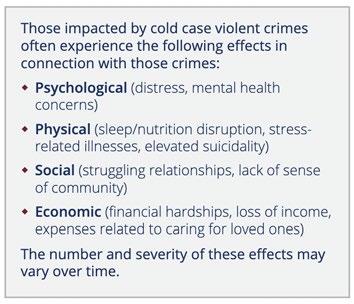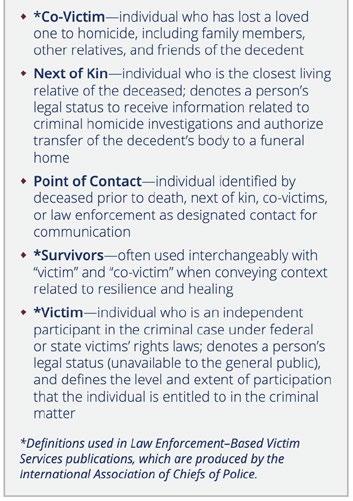
1 minute read
IMPACTED BY COLD CASE VIOLENT CRIMES
Renewing a cold case violent crime investigation may require engaging several individuals to relay new information, clarify prior efforts and decisions, or discuss the return or destruction of property that was originally collected through investigative actions.
A need often exists to communicate with individuals— other than those identified as next of kin and victims— who have been impacted by reported crimes; those individuals are collectively referred to as co-victims or survivors and can include romantic partners, close friends, roommates, colleagues, or other family members who are not legally next of kin.
Law enforcement officials and prosecutors are invested in solving these cases because they have authority over the investigation of violent crimes and over decisions related to legal accountability, respectively. Co-victims/survivors are often just as invested on an emotional level in the progress of cases, and these individuals often express a desire for routine and timely updates and communication.
Additionally, having access to case-related information can influence co-victims’/survivors’ responses and decisions related to a crime’s psychological, physical, social, and economic effects. For example, sharing information about a suspect’s status may affect overall stress levels for those impacted by crime and allow them to use the information for key decisions related to housing and safety concerns.

Justice system professionals may believe that they can cause emotional harm by sharing information that is not meaningful or involves details that are too distressing. This belief can lead to minimizing contact with those impacted by cold case violent crimes in an attempt to shield them from potentially upsetting information. However, when these individuals do not receive additional communication and are contacted only to serve as a potential source for case information, they may experience a lack of control and develop negative impressions of the justice system— resulting in downstream engagement issues.
As information gatekeepers, justice system professionals are encouraged to embrace the potential not only to minimize harm but also to facilitate positive outcomes. Developing balanced and consistent communication plans allows justice system professionals to foster trust with co-victims/survivors, creating a mutually beneficial relationship that enhances investigators’ ability to access comprehensive information from co- victims/survivors. This approach aids the investigation and improves case outcomes, while meeting the needs of those impacted by violent crime.



